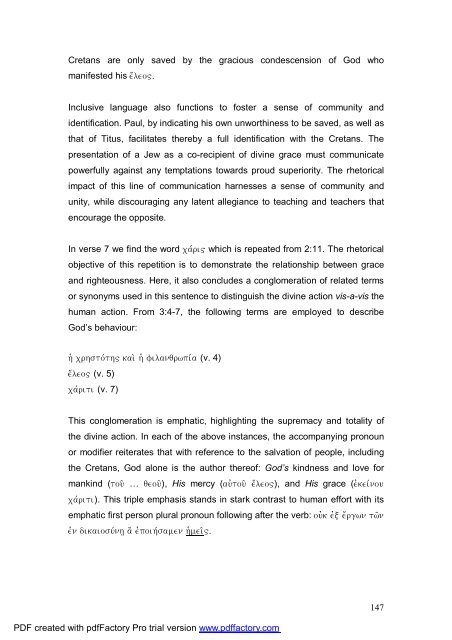A Text centred rhetorical analysis of Paul's Letter to Titus
A Text centred rhetorical analysis of Paul's Letter to Titus
A Text centred rhetorical analysis of Paul's Letter to Titus
You also want an ePaper? Increase the reach of your titles
YUMPU automatically turns print PDFs into web optimized ePapers that Google loves.
Cretans are only saved by the gracious condescension <strong>of</strong> God who<br />
manifested his e[leo".<br />
Inclusive language also functions <strong>to</strong> foster a sense <strong>of</strong> community and<br />
identification. Paul, by indicating his own unworthiness <strong>to</strong> be saved, as well as<br />
that <strong>of</strong> <strong>Titus</strong>, facilitates thereby a full identification with the Cretans. The<br />
presentation <strong>of</strong> a Jew as a co-recipient <strong>of</strong> divine grace must communicate<br />
powerfully against any temptations <strong>to</strong>wards proud superiority. The <strong>rhe<strong>to</strong>rical</strong><br />
impact <strong>of</strong> this line <strong>of</strong> communication harnesses a sense <strong>of</strong> community and<br />
unity, while discouraging any latent allegiance <strong>to</strong> teaching and teachers that<br />
encourage the opposite.<br />
In verse 7 we find the word cavri~ which is repeated from 2:11. The <strong>rhe<strong>to</strong>rical</strong><br />
objective <strong>of</strong> this repetition is <strong>to</strong> demonstrate the relationship between grace<br />
and righteousness. Here, it also concludes a conglomeration <strong>of</strong> related terms<br />
or synonyms used in this sentence <strong>to</strong> distinguish the divine action vis-a-vis the<br />
human action. From 3:4-7, the following terms are employed <strong>to</strong> describe<br />
God’s behaviour:<br />
hJ crhs<strong>to</strong>vth" kai; hJ filanqrwpiva (v. 4)<br />
e[leo" (v. 5)<br />
cavriti (v. 7)<br />
This conglomeration is emphatic, highlighting the supremacy and <strong>to</strong>tality <strong>of</strong><br />
the divine action. In each <strong>of</strong> the above instances, the accompanying pronoun<br />
or modifier reiterates that with reference <strong>to</strong> the salvation <strong>of</strong> people, including<br />
the Cretans, God alone is the author there<strong>of</strong>: God’s kindness and love for<br />
mankind (<strong>to</strong>u` … qeou'), His mercy (auj<strong>to</strong>u` e[leo"), and His grace (ejkeivnou<br />
cavriti). This triple emphasis stands in stark contrast <strong>to</strong> human effort with its<br />
emphatic first person plural pronoun following after the verb: oujk ejx e[rgwn tw`n<br />
ejn dikaiosuvnh/ a} ejpoihvsamen hJmei`".<br />
PDF created with pdfFac<strong>to</strong>ry Pro trial version www.pdffac<strong>to</strong>ry.com<br />
147

















